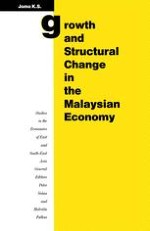1990 | OriginalPaper | Chapter
The New Economic Policy
Author : K. S. Jomo
Published in: Growth and Structural Change in the Malaysian Economy
Publisher: Palgrave Macmillan UK
Included in: Professional Book Archive
Activate our intelligent search to find suitable subject content or patents.
Select sections of text to find matching patents with Artificial Intelligence. powered by
Select sections of text to find additional relevant content using AI-assisted search. powered by
With Independence on 31 August 1957, formal political authority was officially handed over the British to the Malayan political élite represented by the Alliance Party, led by Tunku Abdul Rahman. The Alliance — consisting of the United Malays National Organisation (UMNO), the Malayan Chinese Association (MCA) and the Malayan Indian Congress (MIC), represented the politically dominant Malay aristocratic and bureaucratic elements, Chinese business interests and the Indian middle class respectively. As part of the political compromise underlying the Alliance, the UMNO-led government was expected to continue to encourage the development of a Malay business community, already begun in the early 1950s through the Rural Industrial Development Authority (RIDA). In the first decade or so after Independence, the expansion of the Malay middle class mainly involved enhanced educational opportunities, recruitment quotas into the state machinery, and other types of ‘preferential treatment’. But as the Malay middle class grew, it began to demand even more support for further expansion, especially into the ‘commanding heights’ of big business. The Tunku’s Alliance government was increasingly considered insufficiently responsive to such demands, increasingly articulated by the so-called ‘Young Turks’ and ‘ultras’ within UMNO in the late 1960s.
